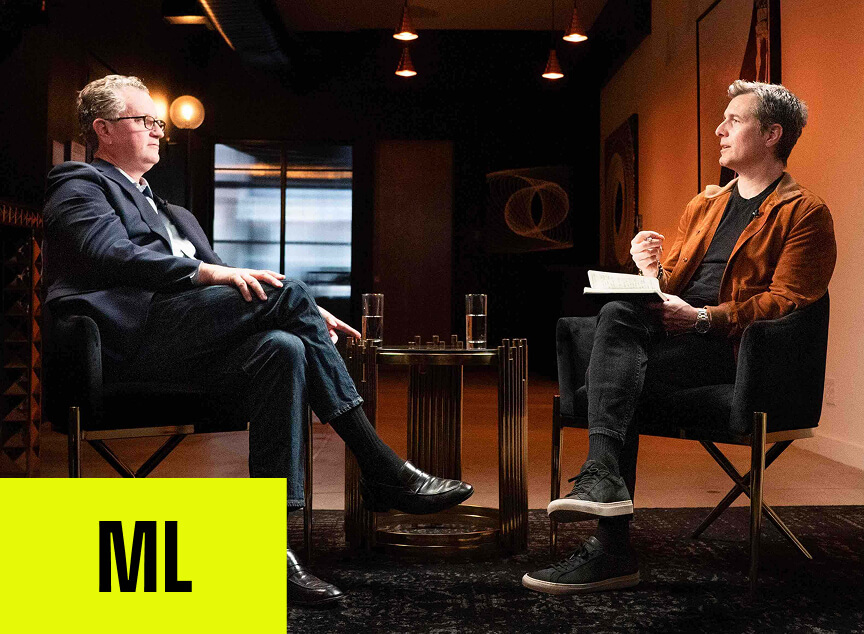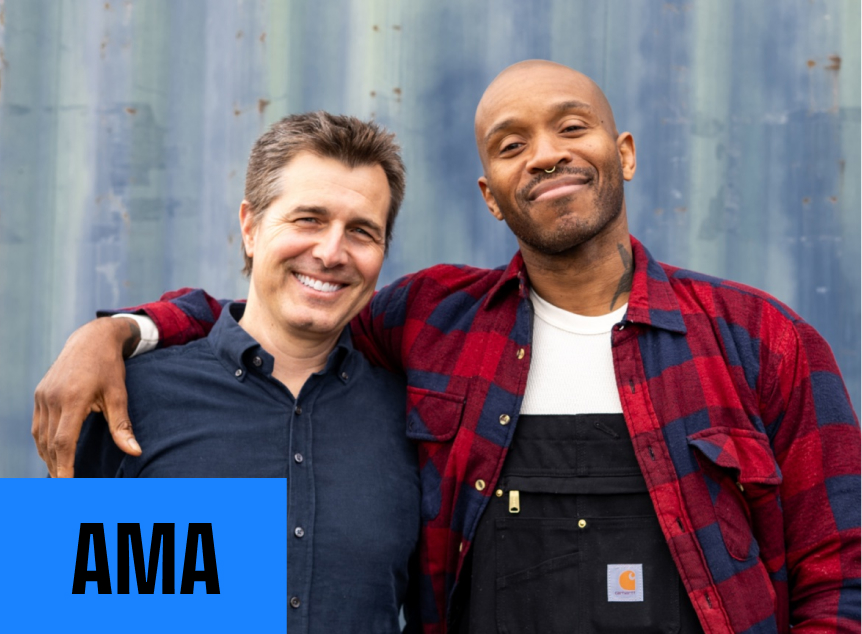This week, we’re really excited to share another installment of our Ask Me Anything series. In this episode, we explore your questions about psychological safety, therapy, motivation, passion, and so much more.
For this AMA, Michael Rosenbaum dropped by to help facilitate the conversation – and I think you’re going to love it. Michael is an actor, comedian, podcaster, and all-around incredible human. He’s famously known for portraying Lex Luthor on the Superman TV series, Smallville, and has recently entered the Marvel Universe – in Guardians of the Galaxy.
He also hosts his own podcast, Inside of You with Michael Rosenbaum.
Your questions took us to some fascinating places, and we have some fun at the end when Michael trots out his Adam Sandler impression, reveals why he left Smallville, and walks us through the plot of his dream turned movie pitch, Saving Chris Farley.
As always, feel free to reach out to info@findingmastery.net with feedback or any questions you may have for future AMAs.
I keep saying it, but it’s an honor to answer the questions you all are sending in. Keep carving your path with fire.
“Now is a great moment to just reflect and ask yourself if you’re working from the outside-in, or the inside-out. Inside-out is durable. It’ll stand up over time. The outside-in is fleeting and temporary.”
In This Episode:
Training your mind
The reason that I train my mind, the reason that athletes and people that I work with train their mind is that so that they can be in the present moment more often. It’s the more often part. So you train up a skill, psychological skills, so that you can be you in the present moment more often. So you got to work your ass off, most of us do, to kind of return to that brilliant innocence of taking your hands off the steering wheel and kind of being in the present moment as it unfolds. So no easy answer but just like I said across, set aside time to kind of train my body or to train something in my technical craft I want to get better at. I also set aside time to train my mind. And so it’s discreet. So it’s not this bleeding thing that’s running throughout the day. It’s the discreet time that I’m training my mind.
Be here now
Being here now is brilliant. But if you’re not training for that, the present moment can whip you in a million different directions. Your mind can whip you in another million different directions. And so we train our mind so that we can be in the present moment more often. So you need both. But the reason that we’re training is to be here now. And to your point is you start small to build a habit. So chunk something small that you can do to train your mind, like confidence or being calm or mental imagery or whatever. And just chunk it and start small. And then eventually over time, you build a more meaningful habit.
Psychological safety at work?
There was a big rage about psychological safety in the workplace a handful of years ago. So the idea is let’s create a space at the work in a work environment where people feel safe enough to be able to say what’s true or what’s honest. But the purpose of that is not to create therapy at work. The purpose of that is to create enough psychological safety where you can wave a flag, speak some truth, so that the team can be better, so that you can move the service of the product down the field. But, this is not therapy at work. That’s not what this is about. So yes, you do need to be able to use your voice in whatever way you are most comfortable in doing that you could communicate to others what’s happening inside of you or what you’re noticing or watching.
Using negativity as fuel (Rosenbaum)
I remember growing up and hearing the same thing that I was stupid. Why can’t I figure this out? Why can’t I do this problem? I just always felt stupid. I always felt like I was not a smart kid, and that weighed on me. In fact, subconsciously, no matter how much you work on yourself, at least for me, it remains. It’s still there. And sometimes it comes out if I don’t know something or if I feel like I have no common sense about something or if I fail at something, I feel that stupid feeling, that dumb feeling… I would try to be as successful as I could to prove that theory wrong. I was going to be the biggest actor. I was going to make it. I was going to lead this small town, and I did it all. But there comes a time in your life where you have to say, “I don’t need to prove myself anymore. I need to do what I love doing, what I’m passionate about doing.” And for all those reasons and let go of that old thought in your mind since you were a kid that you were dumb because it doesn’t make any sense anymore. It doesn’t. It’s logically insane to think that for all the things you’ve done. We all say stupid things. We all do dumb things. It doesn’t mean we’re dumb.
Thinking about your future
Strip it down to investing in the way you think about your future. So what does that mean? There’s a lens that all of us think about our future through. It’s either optimism or pessimism, and it’s one of those two. And we’re not born, as far as we know, with a predetermined view of the future, meaning you’re not born pessimistic or optimistic. So I would say the first thing to do in this high ambiguity, high stress environment is to train optimism. So one way, one simple way to train optimism is to find what’s amazing in your life right now.
What are you (Dr. Mike) struggling with right now?
It’s selfishness. That’s the thing that I can hide behind ambition, and I can hide behind deep interest to grow something, and I can hide behind building a business that is noble in cause, meaning democratizing in this beautiful science of psychology, but there’s a selfishness that comes with it. And the selfishness comes from spending the time with my family as opposed to spending time with business. And so I think that that’s the part that I struggle with is knowing where I’m doing a service and a disservice, and I can over-rotate quickly to pour all in into the thing that I’m building from a business standpoint and diminish the thing I want to build from a family standpoint. And that scares me. I don’t love it. So that’s the kind of inner civil war within myself is figuring out how to have a rising tide between both of those. And a deep regret for me will be to get to the end of my life and have this beautiful community and business and then have somebody, my wife or my son have a shitty eulogy.
Vulnerability (Rosenbaum)
We all make mistakes. And back to being vulnerable. I think vulnerability, I think, used to be more of a weakness. Now I think people want to see people. You never see the presidents… Maybe Biden’s a little vulnerable at times, but it’s such a cool thing to see from leaders that when you could see someone really upset and moved by something that happened, albeit like a school shooting or something and seeing a leader not just go, “We’ve got to make a law here. We’ve got to make rules,” but instead send prayers and bullshit. But really, it affects him viscerally. Real empathy, sympathy, that is power also in a leader.
Modern idea of passion
The old idea of passion is that if I could just do the thing that I loved and then I would have more passion in my life where that model has been wrong for a lot of years. The idea is let me figure out how I can have passion everywhere I go with everything that I do across the 16 hours that I’m getting after it as I’m awake.
But… what’s next?
When I was young, I always thought I wanted to be this big movie star, I want to be famous, and I want to be the best actor. And as I got older, I started to realize, “Hey, you’re still living the dream. You’re acting. You’re making money. Oh, yeah. It’s a good life.” I became sort of content, right? I sort of was like, “Hey, I have a lot to be proud of. I’m grateful. This is fine. But what’s next?” And then inadvertently, I stumbled upon doing these podcasts and making music. So my thought is you will find something else. There’s so many things out there that we don’t even know about. Keep exploring, keep learning, and something might just come up that you go, “Wow.”
Working from the inside out
It’s a great moment to just reflect and say, “Am I working from the outside in, or am I working from the inside out?” The inside out is durable. It’ll stand up over time. The outside in is fleeting and temporary. And so, nothing wrong with good rewards, nothing wrong with external goals as long as they’re counterbalanced to internal goals as well.
Command of yourself
Another way to think about mastery is that there’s a radical command that you have of yourself. There’s a radical command you have with your craft. And with that radical command, there’s this deep trust that comes along with it so that you are looking for spontaneity more than you’re looking for proficiency. You are looking for the explosiveness that naturally could happen in a moment. And knowing that you’re able to capture those elements that are swirling in a present moment and create something special from them.



